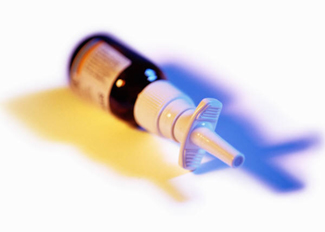Treatment for von Willebrand Disease
Von Willebrand Disease can be treated in several ways. The doctor at the HTC can check to see which treatment will work the best.

One medicine that is used is DDAVP (desmopressin acetate). This drug causes von Willebrand factor that is stored in the body to be released into the bloodstream. Because it does not work for everyone, the doctor will first check the effect of DDAVP by giving the patient a dose when she or he is not bleeding. The doctor will then measure the von Willebrand factor level in the blood to see if it went up enough to stop bleeding. DDAVP can cause side effects – low sodium and possibly seizures – so doctors may not want to use it in elderly people or children under age five.
Most people use a form of DDAVP that is sprayed into the nose. It is known by the brand name Stimate®. From the nose, it is absorbed into the blood. DDAVP can also be injected directly into the blood through a vein or given as a shot under the skin.
Factor concentrate is the usual treatment for people with severe Type 1, Type 2A, Type 2B, and Type 3 VWD and those whose bodies don’t respond to DDAVP. People with VWD must use factor concentrate that has VWF in it. This means that they cannot use the recombinant factor products used by people with Hemophilia. Those products only contain factor VIII or factor IX. They don’t have any von Willebrand factor. In the United States, these are the brands of factor concentrate that contain VWF: Alphanate SD®, Humate P®, Koate DVI®, Wilate®, and Vonvendi® (the first recombinant VWF approved by the FDA). In an emergency, doctors might give a person with VWD a blood product called cryoprecipitate to stop bleeding. It contains von Willebrand factor along with other factor proteins. However, since cryoprecipitate is not treated to kill viruses, it is not recommended. It is used only if other medicines are not available at all.
In general, people with mild to moderate VWD can expect few problems with bleeding except when having surgery. A person with severe VWD may have many of the same problems that a person with Hemophilia has, including bleeding into joints. They need to treat bleeds early, visit an HTC regularly, and be under the care of a hematologist.
People with VWD should not take aspirin or ibuprofen or medicines that contain them. The aspirin will make the platelets not work as well. It is best to ask the pharmacist before using any drug off the shelf. Aspirin is put in some of the least-likely medicines. Taking large amounts of vitamin E can also mess up your platelets. They can’t stick together as well.
People with VWD should carry medical alert information like wallet cards, necklaces, and bracelets. These should include their disease, their factor levels, and how they are treated for bleeding.
